The Lawrence City Commission on Tuesday soundly adopted a local ordinance protecting people from racial discrimination based on hair, making Lawrence the first city in Kansas to do so.
“This is huge for our community,” Commissioner Amber Sellers said. “This is huge for our state. This is huge for individuals who live here who are trying to thrive and survive here — that they can balance and feel that they can take their nurtured self and bring it out into the community, unapologetically.”
The CROWN Act, which stands for “Creating a Respectful and Open World for Natural Hair,” combats race-based hair discrimination in the workplace, schools or other sectors. It specifically targets protections for Black people who have textured hair or wear natural hairstyles, such as curls, locs, braids, twists, afros, bantu knots and more. It also aims to protect Indigenous people and people of color from discrimination based on hair that reflects culture or race.
Commissioners voted 5-0 to pass Ordinance No. 10003, which bans discrimination on natural hair and hairstyles that have historically been deemed as “unprofessional.” The ordinance will appear on the commission’s consent agenda for a second reading during a future meeting, and once approved, it will go into effect.
City code language on discrimination has been amended to include adding hair texture and hairstyles to the definition of “race,” a protected group. It also defines “protective hairstyles” as including, but not limited to, curls, locs, braids and more.
Shirley’s Kitchen Cabinet, a Kansas City-based organization dedicated to advocacy for Black women, led work with city leaders to make Kansas City, Missouri the second municipality in the country to adopt a version of the CROWN Act. Michele L. Watley, founder of Shirley’s Kitchen Cabinet, over the past several months has offered her expertise to the city in creating its own local version.
The adopted ordinance addresses race-based hair discrimination in employment spaces and other public accommodation spaces. Watley clarified that because public schools are not city entities, the CROWN Act will not directly apply to race-based hair discrimination in schools; however, she said she’s ready to return during the next state legislative session to continue fighting to pass bills related to education.
“As the city works to achieve this mission of being a city where everyone feels welcome and being a city where everyone can enjoy living here, passing the CROWN Act can be a powerful tool in achieving that mission,” Watley said.
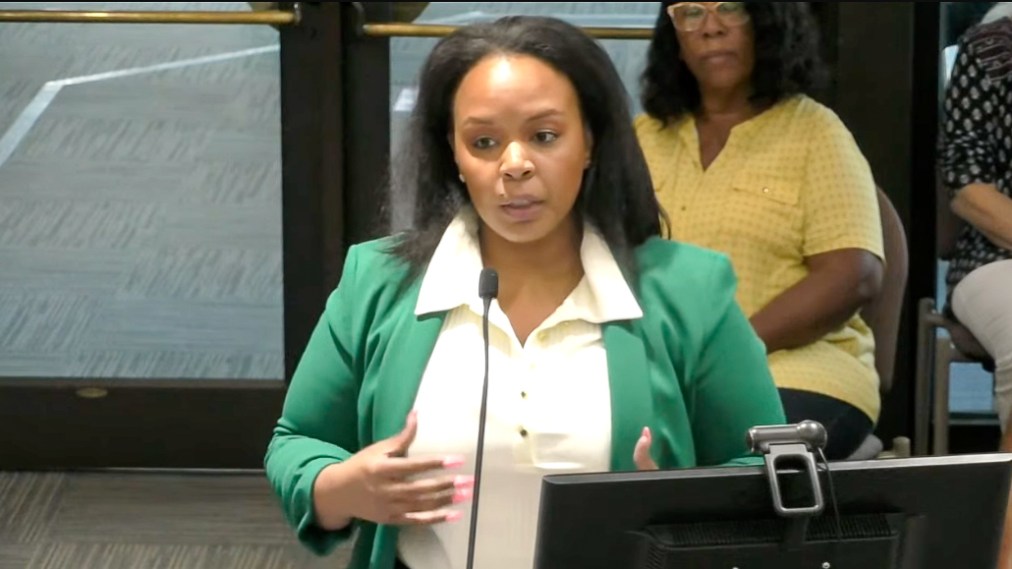
This ordinance is not just about hair, Watley said; it’s about social, economic, and mental and physical health impacts. People of color experience being turned away from jobs because of their hair. Black women who feel obligated to use chemical relaxers to straighten their hair often sustain burn injuries and face higher risks of certain cancers.
Grassroots proponents of the CROWN Act during a press conference on Monday shared their lived experiences as Black individuals. (Read more about their stories in this article.)
Watley credited local Black activists and organizations for collaborating with her on Shirley’s Kitchen Cabinet’s initiative. Leaders of Black:30, Lawrence Branch NAACP, Curlology, B.L.A.C.K. Lawrence, Lawrence KS Juneteenth and Loud Light worked with Watley to spread messages of support across Lawrence.
Watley on Feb. 23 first provided a presentation to the Lawrence Human Relations Commission on what similar efforts in Lawrence would look like. She said she and her team have gotten a House and Senate bill introduced every year since 2020, but they have yet to see any meaningful movement at the state level, so they shifted their focus to cities and municipalities. After the HRC voiced support, Watley returned to an HRC meeting on June 22, contributing more of her input. HRC members during that meeting voted to ask city legal staff members to draft an ordinance, and that language was then provided to city commissioners for its review Tuesday.
Approximately a dozen community members on Tuesday spoke in support of passing the ordinance.
Breanna Bell, co-founder of Prestige Hair Salon in Lawrence and owner of Curlology, told commissioners Tuesday about her work as a hair professional in Lawrence.
“For the past five years, my salon has proudly served the diverse community of Lawrence,” Bell said. “We pride ourselves in catering to all hair types, textures, and promoting the acceptance and the celebration of natural beauty, yet I have personally witnessed the impact of societal norms and expectations that forced many of my clients to alter their natural hair to conform to certain standards.”
Brooklynne Mosley, who’s an East Lawrence resident, said her hair journey has been like that of many Black women — a journey that’s led to empowerment.
“Like many women who look like me, my hair has been dyed, fried and laid to the side,” Mosley said. “But over the last few years, I’ve shifted to protective and natural styles, like cornrows, micro braids, and afro. I stand here with my flyest style: these locks that are maintained by Ms. Janine Colter at Hidden Jewel Salon here in Lawrence, Kansas.”
Sellers gave an emotional account before voting Tuesday. She recalled being 6 years old when a peer at the pool compared her hair to dog hair. Experiences like that cause trauma and anxiety in young Black kids and follow them through their adult years, she said.
But the feeling of unapologetic joy in Black kids growing up to love their natural hair is triumphant, Sellers added.
“Things such as passing the CROWN Act allows us to see that joy — to allow young Black little girls and Black little boys to see the joy in just being who they are and having to be able to drown out the world telling them that they’re not enough showing up as they are … And so the CROWN Act has value to it that allows us to wear our crown and all of its wonderful glory,” Sellers said. “And so I want to give that hope. I want to take that anxiety away so that we can truly be a community that believes that we all can strive and thrive together.”
If our local journalism matters to you, please help us keep doing this work.
Don’t miss a beat … Click here to sign up for our email newsletters

Maya Hodison (she/her), equity reporter, can be reached at mhodison (at) lawrencekstimes (dot) com. Read more of her work for the Times here. Check out her staff bio here.
More on anti-discrimination ordinances:
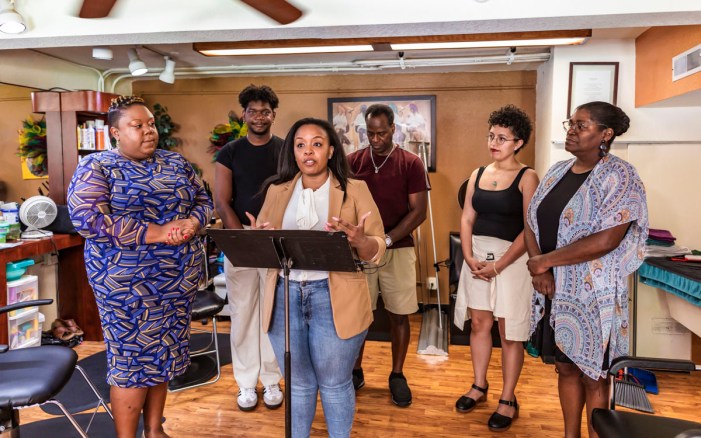 Molly Adams / Lawrence Times
Molly Adams / Lawrence Times Grassroots proponents of the CROWN Act gathered Monday to push for approval of anti-discrimination protections to give people of color freedom to wear their hair as they wish.
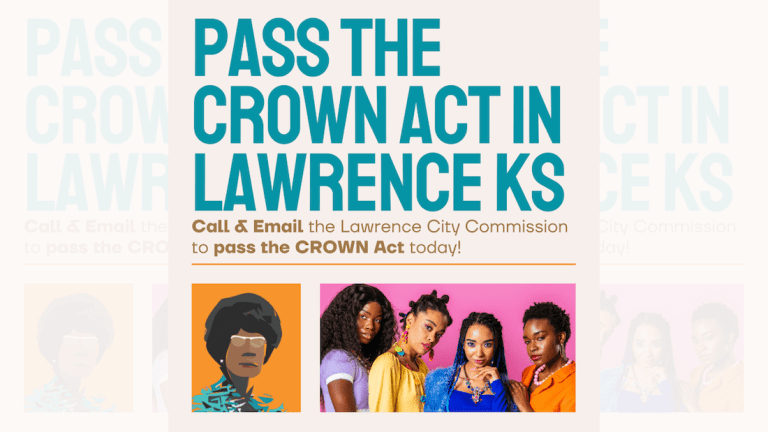
Lawrence city commissioners are considering an ordinance that would secure anti-discrimination protections for people with textured hair, and organizers are urging the community to support its deeper meaning.
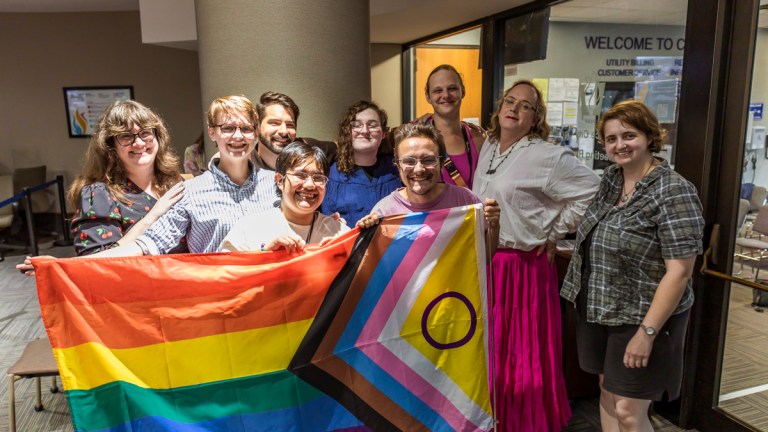 Molly Adams / Lawrence Times
Molly Adams / Lawrence Times Activists with No SB 180 in Lawrence, who recently saw the Lawrence City Commission act quickly to pass a local ordinance against Kansas’ anti-trans legislation, are celebrating their successful campaign with a party this week.
Latest Lawrence news:

Lawrence city commissioners on Tuesday approved requests to rezone property, change lot size requirements and more to allow a developer to build 14 single-family homes on the west side of town.
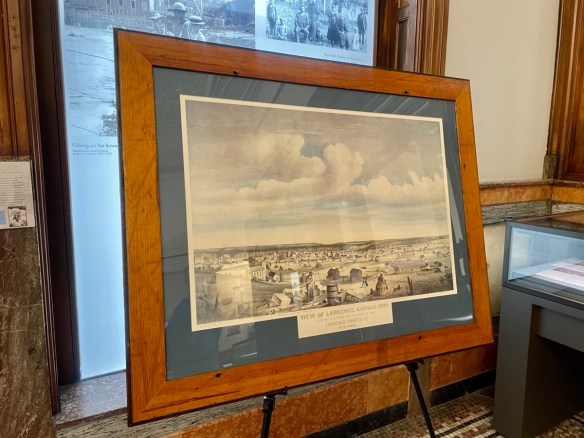
Douglas County’s largest heritage festival will return this weekend, offering Civil War-era tours and lectures and sharing stories of resilience.
This post was originally published on this site be sure to check out more of their content.














